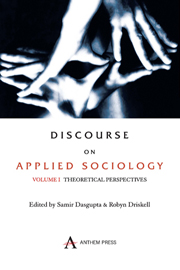Book contents
- Frontmatter
- Contents
- Preface and Acknowledgement
- Contributors to this Volume
- List of Abbreviations
- Introduction
- 1 Re-Orient World History, Social Theory and the Nineteenth Century
- 2 The Unique Complexity of Social Phenomena and the Uses of Social Science Knowledge
- 3 Unlimited Love, Compassion and Forgiveness: Acts of Moral Examplars
- 4 Theoretical Application
- 5 Applied Sociology's Need to Rethink the Tradition: Sociological Theorizing in a Global Framework
- 6 Social Analysis and Social Action
- 7 The Applied Sociologist as Craftsman
- 8 Applied Sociologists: Its Problems and Prospects
- 9 Sociology and its Application in Society: Giving Sociology its ‘Working’ Meaning
- 10 The Evolution of Sociology Back to its Applied Future
- 11 Contemporary Corporate Crime: Theoretical Perspectives, Cases & Consequences
- Index
9 - Sociology and its Application in Society: Giving Sociology its ‘Working’ Meaning
Published online by Cambridge University Press: 05 March 2012
- Frontmatter
- Contents
- Preface and Acknowledgement
- Contributors to this Volume
- List of Abbreviations
- Introduction
- 1 Re-Orient World History, Social Theory and the Nineteenth Century
- 2 The Unique Complexity of Social Phenomena and the Uses of Social Science Knowledge
- 3 Unlimited Love, Compassion and Forgiveness: Acts of Moral Examplars
- 4 Theoretical Application
- 5 Applied Sociology's Need to Rethink the Tradition: Sociological Theorizing in a Global Framework
- 6 Social Analysis and Social Action
- 7 The Applied Sociologist as Craftsman
- 8 Applied Sociologists: Its Problems and Prospects
- 9 Sociology and its Application in Society: Giving Sociology its ‘Working’ Meaning
- 10 The Evolution of Sociology Back to its Applied Future
- 11 Contemporary Corporate Crime: Theoretical Perspectives, Cases & Consequences
- Index
Summary
In the summer of 1996 I arrived in Germany for further studies. Before I left my homeland, Cameroon, my secondary school teachers, family, friends and acquaintances were very sure I would take up a course in natural science, most probably either in Information Technology (IT) or engineering. Personally, even I wished to study natural science until about 1992 – when an usual phenomenon – changed my mind. Round about this time a political ‘wind of change’ blew across Africa, which came to affect the political life of the people of Cameroon also. Such political upheaval also ushered in social changes which, in turn, paved the way for a series of questions that called for immediate answers – from the ‘governance’. As a result of this change, the people of Cameroon were introduced to democracy, which meant, the citizens got the opportunity to choose their leaders (party or parties) and therefore, could do away with the prevailing system of governance, which failed to satisfy the people. All this while, I remained a keen observant of the situation. My direct social environment (my family and peers) influenced me to be preoccupied with what was going around me. Problems arose in my family when my father indulged in the age-old custom of polygamy on the pretext of respecting tradition. Similarly an alarming rate of ‘juvenile delinquency’, such as unwanted or teenage pregnancies, abortion and even death, became a common phenomenon among my peers.
- Type
- Chapter
- Information
- Discourse on Applied SociologyTheoretical Perspectives, pp. 223 - 236Publisher: Anthem PressPrint publication year: 2007



